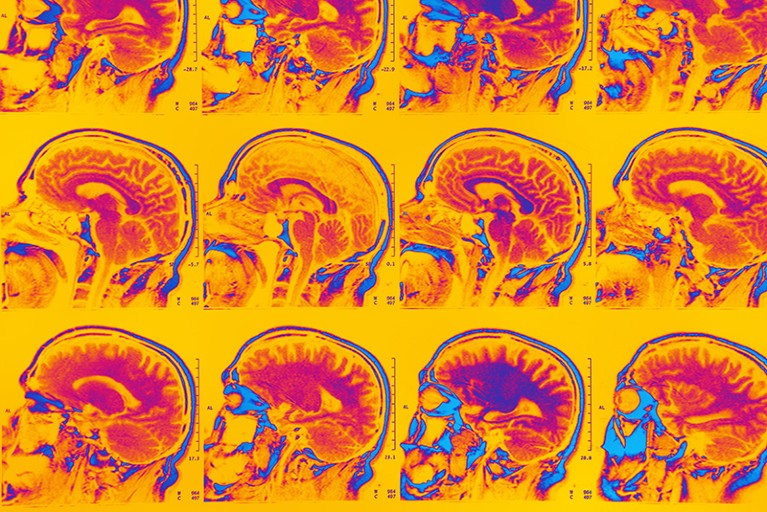
Neuroimaging research uses scans to deepen understanding of the brain and its diseases — but it has tended to focus on men of European descent.Credit: iStock/Getty
An institute that aims to improve how equality and diversity policies are applied to brain research has launched at University College London. The founders say that although equity, diversity and inclusion (EDI) guidelines are now common in research, they do not necessarily lead to scientists applying the values to their studies and work environments in practice.
Many universities, scientific journals and funding agencies have EDI principles, says Aikaterini Fotopoulou, a University College London (UCL) neuropsychologist and leader of the Centre for Equality Research in Brain Sciences (ERB Centre), which launched on 19 April. “But that’s not the same as knowing how to do equality. Intention is not action.”
Researchers and clinicians at the ERB Centre will study how to best practice EDI in the brain and mind sciences — from increasing the diversity of study participants to ensuring that the field includes scientists from a range of backgrounds and supports them with evidence-based EDI policies throughout their careers.
“EDI are often thought to be issues that can be discussed administratively without oftentimes using research backing, so having a research centre dedicated to these issues will be a big leap for the field,” says Mahmoud Maina, a neuroscientist at the University of Sussex in Brighton, UK.
Inclusive sampling
Table of Contents
Inequalities in sampling and recruiting participants for brain research can ultimately affect diagnosis and treatment, says Fotopoulou. “It is well documented that minority groups have poorer mental- and brain-health outcomes, yet they are systematically under-represented in neuroscientific and mental-health research.”
For example, most studies on Alzheimer’s and Parkinson’s diseases involve participants of European ancestry. “We cannot extrapolate the data from European participants to African populations,” says Wael Mohamed, a physician–neuroscientist at the International Islamic University Malaysia in Kuantan.
And neuroimaging research, which uses scans to investigate the brain and its diseases, is conducted mostly in men, on the assumption that menstrual cycles make women less reliable research subjects. But research that tests the consistency of findings has shown that studies in women can be more reliable than those in men, says Fotopoulou. Other biases also persist — for instance, research on eating disorders often excludes men. “That under-represents the reality of men in eating disorders, and affects our understanding of pathology, perhaps even the brain mechanisms,” says Fotopoulou.
The centre, which has been funded by an initial annual grant of £100,000 (US$125,000) from UCL, aims to challenge such exclusion and will encourage research on under-represented groups. Its scientists will evaluate current guidelines for inclusive research sampling and create a freely available set of best practices for achieving inclusivity.
“We still have a long way to go,” says Maina, who won a 2022 prize for scientists who have promoted equality in the brain sciences. He adds that the centre will need to establish collaborations with communities that are under-represented in science to address questions related to members’ experiences and to inform policymaking. “These collaborations should be equitable, where the relationship is a win–win and mutually beneficial.”
Research community
The ERB Centre will also look at the publishing industry. One project aims tackle the gap between intentions and actions when it comes to EDI guidelines at neuroscience, psychology and psychiatry journals. In a 2022 study1, Fotopoulou and her colleagues found that 91% of editors at the top 50 psychology journals were in North America or Europe, and only 30% of editors at the top 50 neuroscience journals were women. “If you have more of the same kind of people in a field, you’re likely to have more of the same kind of science,” says Fotopoulou.
Researchers will collate and evaluate EDI policies in an effort to improve the diversity of editorial boards and of peer reviewers, and will develop training programmes to help editors to produce inclusive and diverse content.
Some projects will examine equality policies at universities. One study is exploring whether gender, ethnicity and age have affected how UCL staff experience work-related stress during the COVID-19 pandemic, and whether policies designed to support staff well-being are effective for all groups.
And three psychologists are studying how neurodivergent students at UCL engage with teaching approaches that blend online and in-person learning, with the aim of improving guidelines for inclusive practices.
In future, researchers at the ERB Centre also hope to improve university equity schemes — such as fellowships aimed at candidates from diverse backgrounds, and general diversity training — by tracking over time whether such programmes are effective for all groups.
The centre provides an opportunity to “address some systemic challenges that brain scientists across the globe have been struggling with at the institutional level”, says Rachael Dangarembizi, a neurobiologist at the University of Cape Town in South Africa.
